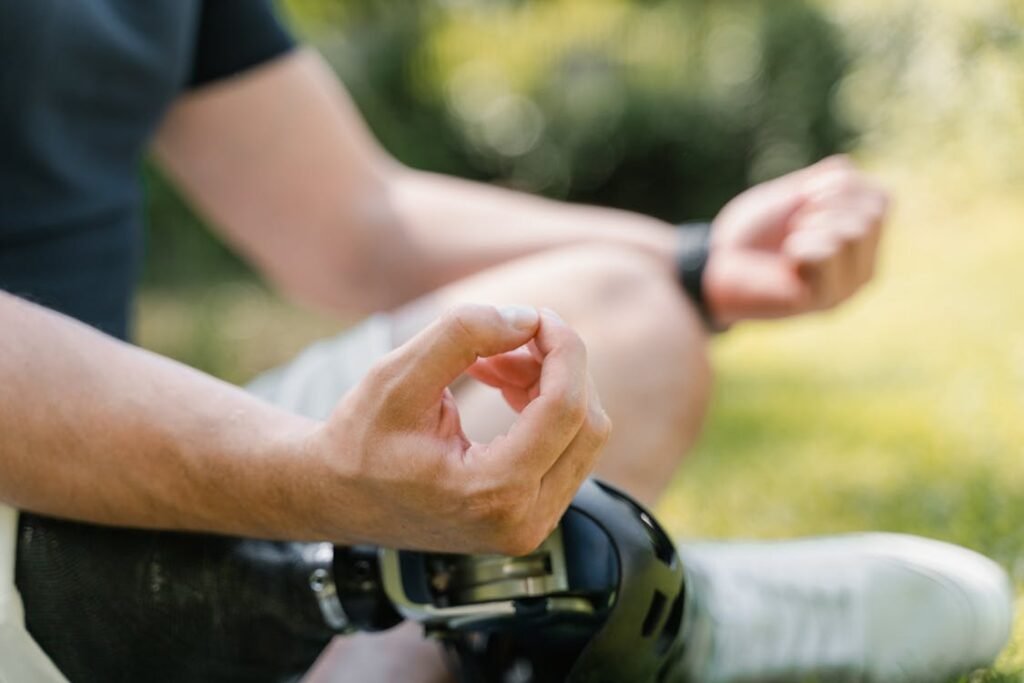Losing a limb changes everything. It’s not just about how you walk, move, or work. It goes much deeper. The emotional pain after an amputation often runs far deeper than the physical wounds. You feel the loss every day—in the way people look at you, in the things you used to do without thinking, and in the quiet moments when the weight of change truly hits.
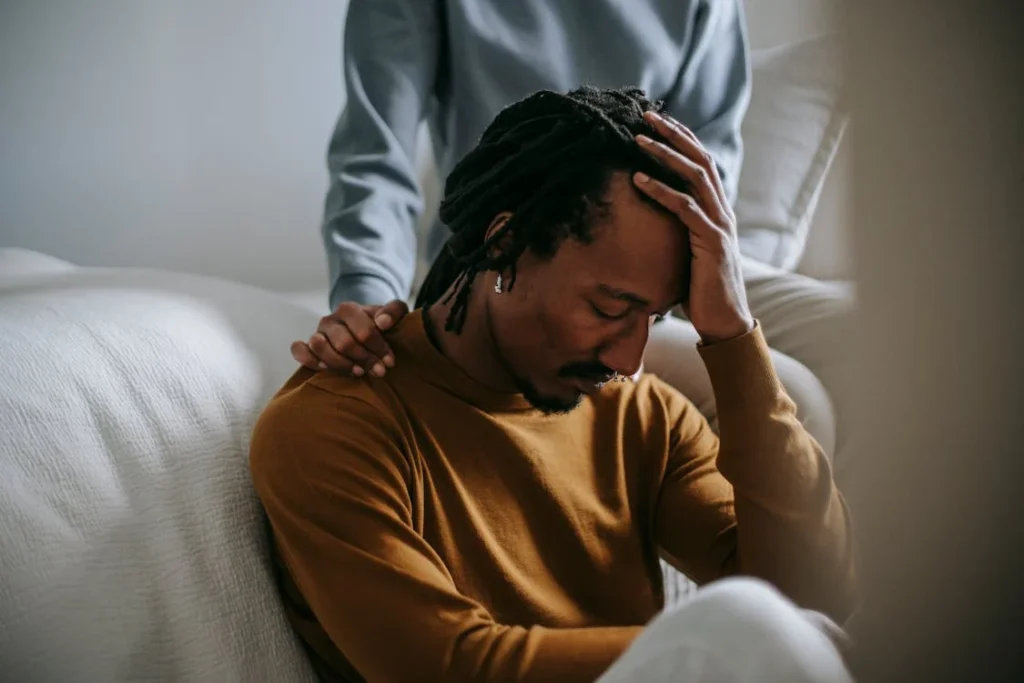
Facing the Emotional Impact of Amputation
The First Days: Shock, Fear, and Silence
Right after an amputation, everything can feel like a blur. You may be surrounded by doctors, nurses, and family, but inside, it might feel completely silent.
Many people describe the first few days as surreal, like they’re watching someone else’s life unfold. You may look down and see that your limb is gone, but your mind hasn’t caught up yet.
That’s because your brain and heart are in shock. This isn’t just a surgery—it’s a life-altering moment. It’s normal to feel overwhelmed, scared, or numb.
You might be asking yourself questions like, “What happens now?” or “Will I ever feel normal again?” Some people cry. Others don’t. Some talk a lot. Others stay quiet.
There is no right or wrong reaction. Your mind is trying to protect you while you adjust to something completely new.
In these first few days, what helps most is kindness—especially toward yourself. You’re not expected to have answers right now. You’re allowed to feel confused.
You’re allowed to grieve. Your body has gone through something intense, and so has your spirit. The most important thing is to give yourself time and space to feel what you need to feel.
Grieving the Loss: It’s More Than Just a Limb
Grief after an amputation isn’t only about the limb that’s gone. It’s about everything that limb represented. You’re also grieving the freedom it gave you, the work you did with it, the way it made you feel strong or useful or whole.
Some people even mourn the identity they had before. You may feel like a different person now—not just in how you look, but in how you see yourself.
This kind of grief is deep. It comes in waves. Some days you may feel hopeful and motivated. Other days you may feel angry, empty, or like giving up.
This is completely normal. Grief isn’t a straight line. It loops, dips, and turns without warning. You might feel fine one day, then suddenly break down the next.
That doesn’t mean you’re going backward. It means you’re healing in your own way.
Anger is part of this process too. You might feel angry at your body, at the doctors, at fate, or at others who don’t understand what you’re going through. You may even feel angry at yourself.
These feelings can be scary, but they’re natural. The key is not to push them away. When you let yourself feel, you start to release the weight of what’s happened.
At Robobionics, we’ve seen that people who allow themselves to grieve—without shame or guilt—often recover stronger. They’re not hiding from their emotions. They’re working through them, slowly but surely. That’s the real path forward.
Loneliness After the Surgery
Once you leave the hospital, the emotional journey doesn’t stop. In fact, for many, it becomes even harder.
When the visitors go home and the medical team is no longer nearby, you’re left with long, quiet hours. It’s in those moments that loneliness often sets in.
You might look at others and feel like they can’t possibly understand. You might avoid talking about what you’re going through because you don’t want to sound weak or sad.
You might even pretend to be “okay” so others won’t worry. But bottling it up only makes things worse over time.
Loneliness after an amputation is one of the most common—and most painful—emotions people face. But you don’t have to stay in it. Reaching out, even to just one person, can change everything.
Whether it’s a friend, a support group, or a counselor, sharing your experience lightens the emotional load. It reminds you that while your path is unique, you’re not walking it alone.
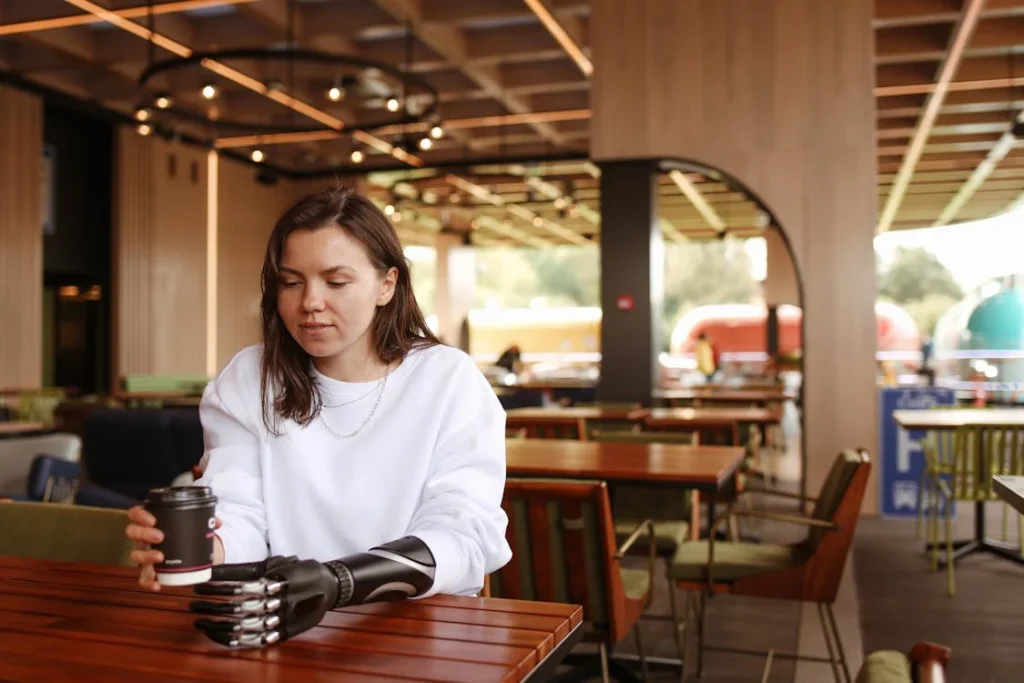
Building Emotional Strength and Regaining Confidence
The Long Road to Acceptance
Acceptance doesn’t happen overnight. It’s not a switch you flip or a moment when everything suddenly feels okay. It’s more like a quiet shift that happens slowly, often without you even realizing it.
One day you look back and see how far you’ve come. Maybe you no longer avoid the mirror. Maybe you feel ready to go outside without covering your limb. Maybe you’ve stopped asking, “Why me?” quite as often.
That’s acceptance. It doesn’t mean you love what happened. It doesn’t mean you’re happy about the loss. It just means you’ve stopped fighting the truth of it.
You’ve started making peace with your new reality—and from that peace, strength grows.
Some days will feel like progress. Others may feel like setbacks. That’s normal. What matters is not giving up. Every hard day you survive makes the next one easier.
And every small act of self-care—taking a walk, talking to a friend, showing up to therapy—is a step toward reclaiming your life.
At Robobionics, we’ve seen this transformation many times. We’ve watched people go from fear to freedom, from grief to growth. It always starts with a decision: to keep going, even when it’s hard.
Rebuilding Confidence Through Small Wins
After an amputation, your confidence can feel shattered. You may question how others see you. You may question how you see yourself.
Even simple tasks like standing, bathing, or dressing can suddenly feel overwhelming. And when your body changes, your self-image often changes too.
That’s why small wins matter. Doing something you couldn’t do a week ago—no matter how small—is powerful. Maybe it’s walking a few steps without help.
Maybe it’s putting on your prosthetic without fear. These moments build confidence slowly, quietly, but surely.
Start with what feels manageable. Each success becomes a foundation for the next. Over time, those small victories become larger ones.
You begin to trust your body again. You begin to believe in your ability to handle what life throws at you.
Confidence isn’t about looking perfect or pretending everything’s okay. It’s about showing up as you are—scars, prosthetics, emotions, and all—and knowing that you still matter.
That you are still whole, still strong, and still capable of joy.
Connecting with Others Who Understand
One of the most powerful ways to heal emotionally is by connecting with other amputees.
There’s something deeply comforting about speaking to someone who truly understands—someone who doesn’t flinch when you talk about phantom pain or body image or fear.
Support groups, whether in person or online, offer a space where you can be honest without judgment. You can ask questions, share struggles, and celebrate progress with people who get it.
These connections often lead to deep friendships that carry you through the hardest parts of recovery.
Sometimes just hearing someone say, “Me too,” is enough to lift the weight of loneliness. It reminds you that you’re part of something bigger.
That others have walked this path and found happiness, strength, and meaning on the other side.

Mental Health Support, Returning to Life, and Finding Purpose
The Importance of Mental Health Support
Recovering emotionally after amputation isn’t something you should face alone. It’s not just about staying strong—it’s about knowing when to ask for help.
Talking to a trained counselor, psychologist, or therapist can make a major difference. These professionals are there to help you unpack the weight you’ve been carrying, especially the pain you don’t always know how to explain.
Sometimes the trauma is deep. You might be having flashbacks of the surgery or the accident. You may struggle to sleep or feel anxious without knowing why.
You may even feel numb, disconnected from the people around you. These are signs that your mind is still in shock—and they deserve real care and attention.
Therapists can help you explore what’s beneath the surface. They won’t tell you what to feel or how to act. They’ll listen. They’ll guide.
They’ll give you tools that slowly bring control back to your life. Talking is not weakness—it’s strength. It’s an act of self-respect, and one of the most powerful tools in emotional recovery.
Many amputees find relief in group therapy or peer counseling too. Just being around others who’ve experienced the same loss can bring healing. It gives you the space to share freely and to listen without fear of judgment.
Re-entering Daily Life with a New Body and Mind
Getting back to daily life can feel daunting. Even simple routines might seem like huge hurdles. Going back to work. Shopping.
Attending family functions. Meeting friends. You may feel nervous about how people will react. You may worry they’ll stare or treat you differently. You may even feel like a stranger in your own skin.
But returning to daily life is a crucial part of healing. The longer you avoid the outside world, the more distant it begins to feel. And the more you face it, even in small ways, the more familiar it becomes again.
Start slow. Take short trips out. Visit places where you feel safe. Let trusted people know what you need. Sometimes that means asking for help.
Sometimes it means asking for space. The important thing is that you are re-entering life on your terms, in your way.
And remember—it’s okay if some days feel harder than others. What matters is that you keep trying.
Every small return—getting dressed, making breakfast, answering a phone call—is a sign that your life is continuing. It may be a different life than before, but it can still be full, meaningful, and deeply satisfying.
Redefining Purpose and Joy After Loss
One of the most profound parts of emotional recovery is rediscovering purpose. After an amputation, many people ask, “What now?”
They wonder if the life they imagined is still possible. They think about dreams they may have to leave behind.
But something powerful can happen in this space of uncertainty. You get a chance to rebuild—not just your body, but your identity, your purpose, your joy.
Some people find new passions. Others return to old ones with fresh perspective. Some get involved in advocacy, helping others who are just beginning their journey.
Others take up art, writing, music, or travel. The key is to give yourself permission to explore.
You don’t need to rush this process. Purpose is not always clear at first. It often grows slowly, through moments of reflection and action.
The important thing is to stay open—to new experiences, new roles, and a new version of yourself.
At Robobionics, we’ve seen people go from broken to bold. We’ve seen them build businesses, mentor others, and live life with more intensity than ever before. Your story isn’t over—it’s just beginning a new chapter.

Navigating Relationships and Social Identity After Amputation
How Amputation Changes Social Dynamics
Amputation doesn’t just change how you see yourself—it also changes how others see you. Sometimes, this shift is subtle. Other times, it’s immediate and overwhelming. You might find that people don’t know what to say.
Some may avoid the topic completely, while others may ask too many personal questions. Friends, coworkers, or even family might act differently, not out of cruelty but because they don’t understand what you’re going through.
This can be one of the most emotionally draining parts of the recovery journey. You may feel like people are focused only on what you’ve lost, not who you are.
You may sense pity in their eyes when you’re simply looking for support. This shift in social identity can lead to feelings of invisibility, or worse, like you’ve become someone people treat as fragile or broken.
But your identity is not limited to your physical body. Your values, your voice, your character, and your passions still exist. If anything, they grow deeper through adversity.
The challenge lies in rebuilding relationships and spaces that reflect your full humanity—not just your medical story.
Talking About Your Amputation: When, How, and Why
Deciding whether—or how—to talk about your amputation is personal. Some people are open from the start. Others prefer privacy. Neither path is right or wrong. What matters is that you feel in control of your own story.
You don’t owe anyone an explanation, but sharing can sometimes ease discomfort, clear misunderstandings, and create connection. You can choose when and how to talk about it.
It might be a simple, honest sentence when someone asks a question. Or it might be a deeper conversation with someone close to you. The key is to speak when you’re ready, not when others expect it.
What often helps is preparing a few simple ways to explain your experience, especially for situations where you’re caught off guard. That way, you’re not scrambling for words, and you can guide the tone of the conversation.
Over time, you may find that speaking about your experience helps others understand you better—and helps you feel stronger, not smaller.
Intimacy and Self-Image in Close Relationships
One of the most sensitive areas of emotional recovery is how amputation affects romantic and intimate relationships.
It’s not just about physical touch. It’s about feeling desirable, confident, and emotionally close to someone else.
You might worry about how your partner sees you. You might hesitate to start a new relationship because you fear rejection or misunderstanding.
These fears are real. And they’re deeply human. But many people find that intimacy is still possible—and often even stronger—after an amputation.
What changes is the need for honest communication, patience, and trust. Sharing your fears with your partner, even if they feel awkward at first, creates space for deeper connection. And that connection is what intimacy is truly built on.
If you’re single, it’s normal to wonder how dating will feel now. Some people worry they will be judged or dismissed. But what we’ve seen at Robobionics is the opposite.
The right people will see your courage, your depth, and your resilience. Those traits often shine even brighter after adversity—and they’re what create meaningful bonds.
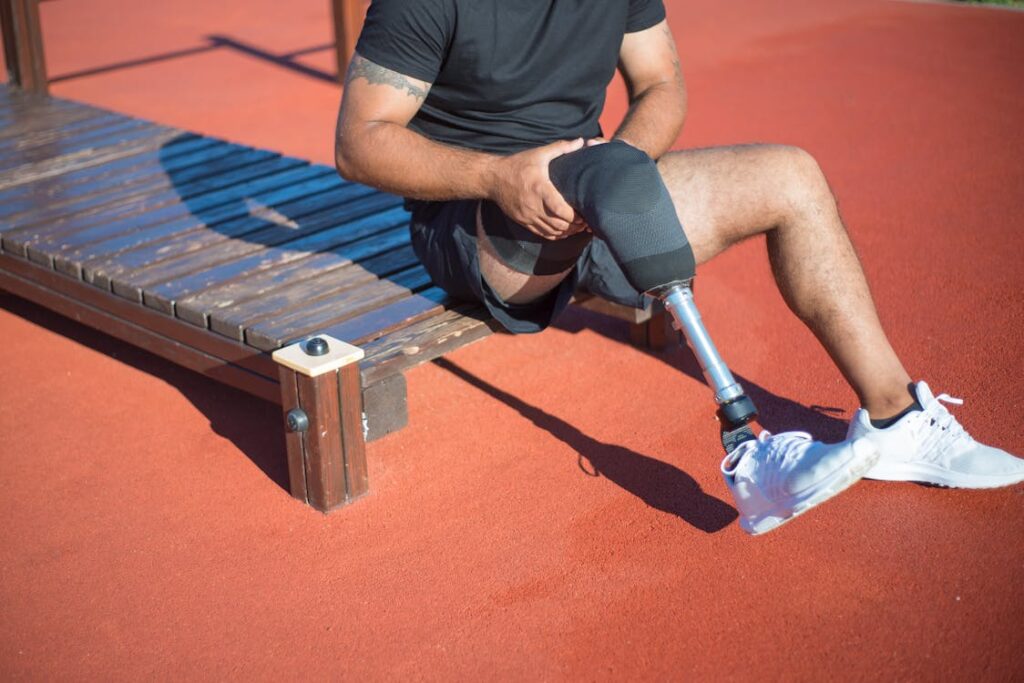
Cultural and Societal Expectations Around Disability in India
The Weight of Social Perception
In India, amputation isn’t just seen through a medical lens—it’s often shaped by deep-rooted cultural beliefs, family expectations, and societal norms.
For many amputees, emotional recovery is made more difficult by how society views disability. There’s often a quiet pressure to hide, to explain, or to prove worth all over again—simply because a visible difference now exists.
In some communities, people still associate disability with weakness or even misfortune. These beliefs can lead to stigma or exclusion, not just from strangers, but sometimes from extended family or local circles.
You might sense pity where you want empowerment. You might face questions like “What happened to you?” that are asked without sensitivity.
This social gaze, constantly watching and sometimes judging, can cause you to feel as though your life has been reduced to what your body has lost.
And yet, many amputees report that once they stop trying to meet other people’s expectations, they start to truly heal.
Reclaiming your identity means understanding that disability does not make you less. It does not erase your skills, your wisdom, or your value in the world.
The real challenge is not your body—it’s shifting how others see you, and more importantly, how you see yourself.
Family Roles and Pressure
Indian families are known for being close-knit, but they can also be intense when someone’s health changes. After an amputation, you may feel a sudden shift in how your family treats you.
Some may become overprotective, limiting your independence without meaning to. Others may expect you to “get over it quickly” and return to your old role, even if you’re still struggling emotionally.
For women, this pressure can be even heavier. In some cases, marriage prospects are affected by outdated attitudes about physical appearance or ability.
For men, the pressure may come from expectations to earn, lead, or “stay strong,” even while dealing with grief and trauma.
Breaking free from these expectations requires courage. It starts with honest conversations—explaining how you feel, what you need, and what your limits truly are.
Sometimes, families just don’t know what to say or do, so they fall back on silence or control. Guiding them with patience can help create better understanding and stronger bonds.
If you face judgment, it’s not a reflection of your worth. It’s a reflection of the social learning that still needs to happen. And change begins when people like you show what is possible after loss.
Religion, Faith, and Emotional Healing
Spirituality is a powerful part of life for many in India. After an amputation, faith can play two roles.
For some, it becomes a pillar of strength—helping them accept what happened, believe in recovery, and find comfort in a higher purpose. For others, it raises questions. They may wonder, “Why me?” or feel punished or abandoned.
No matter your beliefs, faith can be a meaningful tool in emotional healing if approached gently and without guilt.
Prayer, meditation, or simply spending time in sacred spaces can provide peace and perspective. When combined with therapy or support, faith can offer emotional balance that reaches beyond words.
Healing isn’t just about techniques or treatments—it’s also about finding what centers you. For many, spiritual practice becomes a quiet but powerful source of hope.
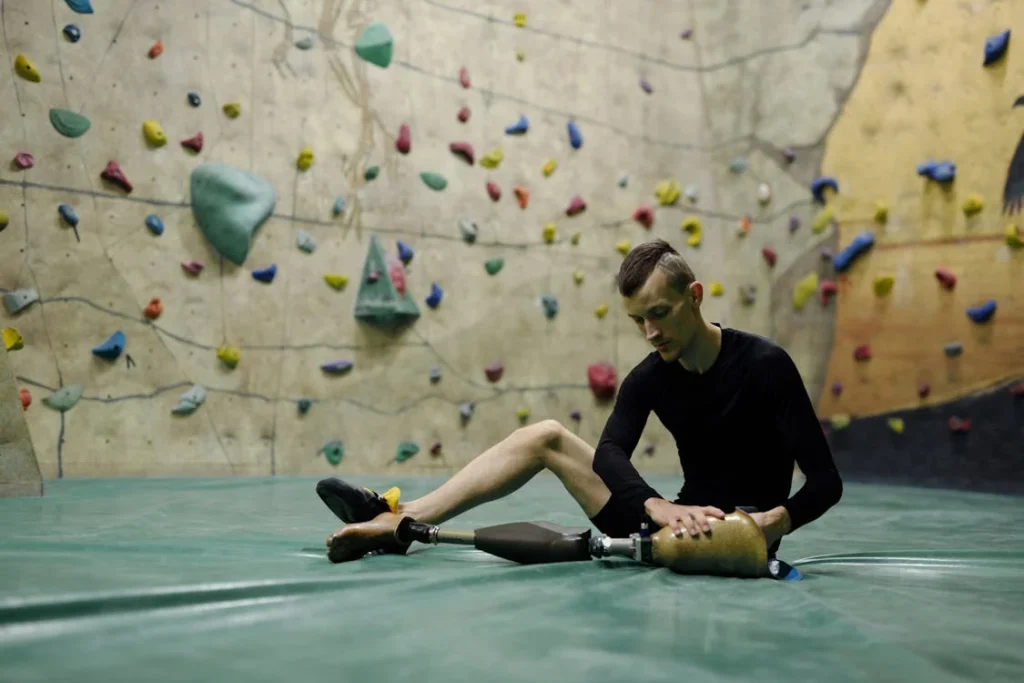
Conclusion
Emotional recovery after amputation is not about returning to who you were. It’s about becoming who you are now—with all your strength, your scars, your fears, and your fight. It’s not easy. You will have days when the weight of it all feels too heavy. But you will also have days when you’ll surprise yourself—when a small win feels like a huge victory, when laughter returns, and when you begin to trust your body and your life again.
You are not alone in this. Across India and the world, there are people just like you, learning to live with loss, to walk with pride, and to love themselves again. There’s no set timeline for healing. There’s only the next step—and your choice to take it.
At Robobionics, we’ve had the honor of walking beside many on this journey. We’ve seen that emotional strength isn’t about being fearless. It’s about moving forward even when you’re afraid. Whether you’re at the beginning of this path or deep into your healing, know that your story matters.
You are not broken. You are becoming. And your future is still full of meaning, purpose, and possibility.



